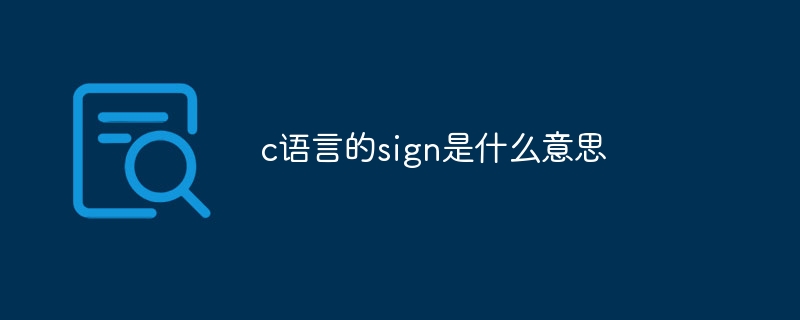Home >Backend Development >C#.Net Tutorial >What does sign mean in C language?
What does sign mean in C language?
- 下次还敢Original
- 2024-04-13 18:12:141310browse
The sign in C language is the sign bit, which indicates the sign of the number. The sign bit affects how numbers behave in arithmetic operations and how they are stored. Provided types include signed char, signed short, signed int, signed long, and signed long long, representing different ranges of signed integers.

sign in C language
sign in C language is the sign bit, which indicates whether the number is a positive number or negative number.
Structure
The sign bit is the highest bit in the binary representation of a number. For positive numbers, the sign bit is 0; for negative numbers, the sign bit is 1.
Influence
The sign bit affects the calculation and storage of numbers:
- Calculation: The sign bit determines Describes how numbers behave in arithmetic operations, such as summation or subtraction.
- Storage: The sign bit affects how numbers are stored in computer memory.
Type
The C language provides the following symbol types:
- signed char: Signed A character type that represents an integer in the range -128 to 127.
- signed short: Signed short integer type, representing an integer ranging from -32,768 to 32,767.
- signed int: Signed integer type, indicating that the range is related to the machine architecture, usually -2,147,483,648 to 2,147,483,647.
- signed long: Signed long integer type, indicating a larger range than signed int.
- signed long long: Signed long integer type, indicating a larger range than signed long.
Example
The following example demonstrates the impact of the sign bit:
<code class="c">int a = 10; // 正数,符号位为 0
int b = -5; // 负数,符号位为 1
printf("a: %d, b: %d\n", a, b);</code>
Output:
<code>a: 10, b: -5</code>
The above is the detailed content of What does sign mean in C language?. For more information, please follow other related articles on the PHP Chinese website!

